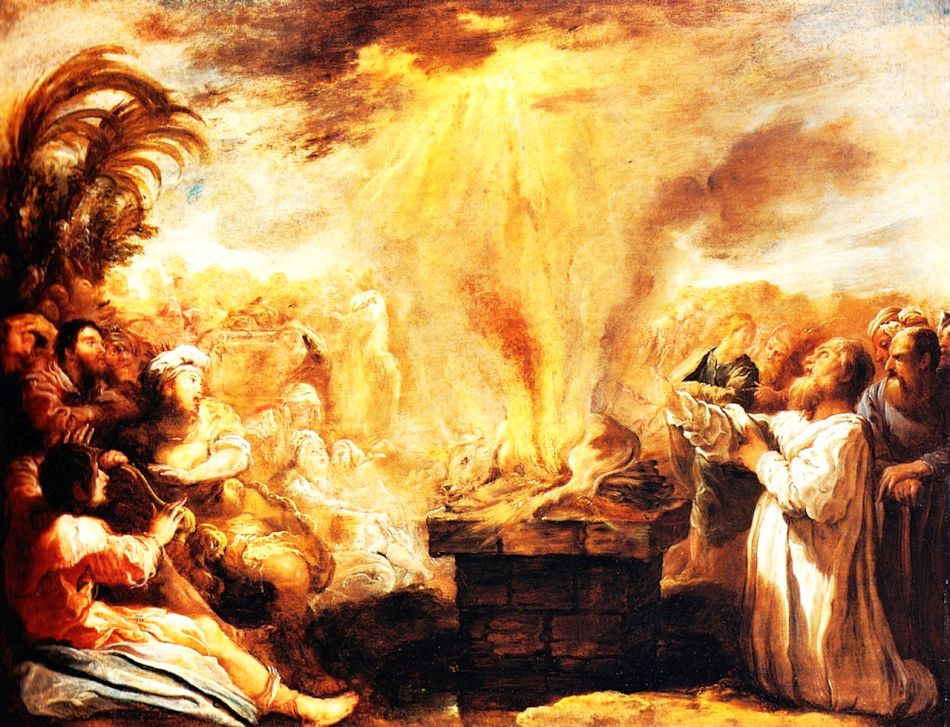An address by Dr Rod Benson on 1 Kings 18:20-46

Domenico Fetti (c. 1589 – 1623)
The story is one relished by Sunday school teachers and enjoyed by their students – although someone who supports interfaith dialogue might be less than enthusiastic about some elements of the narrative.
The story takes place on Israel’s Mediterranean coast, where a lonely mountain rises from the beach to a height of 546 metres. Isaiah called it “a majestic sight” (Isa 35:2). The modern city of Haifa edges up its eastern slope. I’m referring to Mt Carmel.
The summit appears to have been a place of pagan worship at least as early as the 15th century BCE, mentioned in the writings of Pharaoh Thutmose III. In the annals of the Assyrian King Shalmaneser III (841 BCE), Mt Carmel appears as “the mountain of Baal.” The Israelite King Saul established a monument to himself there following a military victory (1 Sam 15:12).
At one time, there was also an altar to the God of Israel on the mountain, but by the time of King Ahab’s reign it had been torn down (1 Kg 18:30) and replaced by altars to the pagan deities Baal and Asherah. In Christian history, hermits lived there from as early as the sixth century, and the Catholic order of Carmelites, founded in 1150, takes its name from the mountain; a Carmelite monastery continues to function there today.
Come with me now, back to King Ahab’s time, where the Israelites are emerging from decades of war and enormous political, social and cultural change. The “golden age” recounted in 1 Kings 1-11 has ended. There are now two kingdoms: Israel in the south, and Judah in the north. By chapter 18, the region is in the grip of a three-year drought and famine. Ahab’s northern kingdom of Judah has spiritually lost its way. The people have forsaken the faith and ethics of the patriarchs, men like Moses and David, for the worship of Baal.
And yet…
One faithful man stands before a crowd of hungry, apostate, disillusioned, desperate people. His name is Elijah. He is one of just a few Israelites who have refused to break the first commandment of the Decalogue: “Do not have other gods besides me” (Ex 20:3).
Elijah faces a dilemma: on Mt Carmel, at the giant Baal shrine, there are 450 prophets of Baal chanting and cutting themselves, imploring their god to bring rain. Elijah can pray to his God for rain, which he does. But if rain comes, Elijah knows that the crowd and the Baal prophets will attribute the blessing to Baal, and Elijah’s lone voice will be drowned by the torrent of praise and adulation to the false god.
Here’s how Elijah resolves his dilemma. He really knows his God. He is convinced that the God he worships is the one true God. So he sets up a contest. He issues a challenge (v. 21; for the full story see 1 Kg 18:20-45).
As this extraordinary event unfolds, I want you to notice four key differences between God and Baal, indicated in verses 19-39.
First, unlike the Baal, Elijah’s God (he knew him as Yahweh) is not territorially limited: he is God of all the earth and everyone living, not merely the spirit guide of a lone mountain top, a single temple, or one people (vv. 19-20).
Second, God is not in the numbers game: there are 450 Baal prophets, but God can use just one person to bring transformational change (vv. 22, 25).
Third, extreme actions do not compel God to act: Elijah appears calm and reserved while the Baal prophets prance and pray around him (vv. 26-29, 36-38). Elijah has no cause to be fearful, frantic, or frenzied.
Fourth, nothing stops the work of God when the time is right (vv. 32-37). On the surface, Elijah’s actions seem to reduce God’s capacity to act in answer to his prayers. But he takes these actions to demonstrate beyond all doubt that this is an act of God, not a freak of nature or the work of Baal, and that Elijah’s God is the only God to be feared and revered.
The Baal prophets continue their “liturgical hoopla” for several hours, with no result. Then Elijah prays to his God, everyone witnesses fire falling from heaven (vv. 36-38), and the crowd is suddenly confronted with a challenge to their worldview: to accept the reality and sovereignty of the true and living God.
People drift away from God, rarely toward God. Determine here and now that you won’t be a drifter. Religious devotion is no substitute for dealing with the true God of the universe. Nothing that you and I possess, or can give or do, is of interest to God: what God wants is your trust, your allegiance, your humble dependence.
This God of Elijah, the God of the Bible, the God and Father of our Lord Jesus Christ, is merciful, patient, and filled with holy love. He is real, personal, and worthy of trust. He sees your contrite heart. He hears your humble prayers.
God is real. Miracles do happen.
Dr Rod Benson is Research Support Officer at Moore Theological College, Sydney. He previously pastored four Baptist churches in Queensland and NSW, and served for 12 years as an ethicist with the Tinsley Institute at Morling College. This address was presented to staff at Moore Theological College in 2023.
